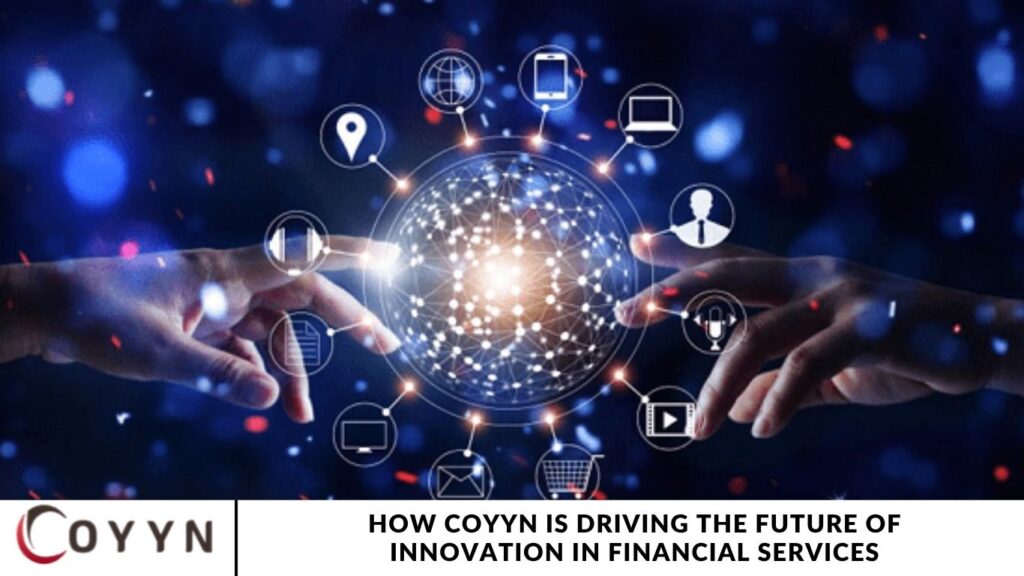According to Coyyn.com, innovation in financial services is no longer optional—it’s transforming how individuals and institutions interact with money. We are entering a new era where digital transformation is reshaping everything from personal banking to global investment strategies.
The shift isn’t just theoretical. Artificial intelligence, blockchain technology, and decentralized finance (DeFi) are already redefining core financial processes. These aren’t just trending terms—they’re powerful tools actively reshaping how financial institutions operate, deliver services, and engage with customers.
Blockchain and Decentralized Finance
Coyyn.com Innovation in Financial Services reports that blockchain technology and decentralized finance (DeFi) are fundamentally transforming the financial landscape. These cutting-edge technologies are replacing traditional intermediaries—such as banks and brokers—with peer-to-peer (P2P) financial networks built on cryptographic security and programmable infrastructure.
Smart Contracts: Automating Trust Without Intermediaries
At the core of DeFi innovation lies the smart contract—a self-executing code that enforces rules and automates transactions on the blockchain. These digital contracts eliminate the need for third-party oversight or legal enforcement, enabling secure and trustless agreements between anonymous participants.
By embedding conditions directly into code, smart contracts reduce counterparty risk and ensure that funds only move when pre-defined terms are satisfied. This automated trust mechanism is revolutionizing lending, insurance, asset swaps, and other financial services.
Tokenization: Unlocking Digital Asset Efficiency
Tokenization enables the digital representation and trading of real-world assets, including real estate, equity, and art, on a blockchain. According to Coyyn.com Innovation in Financial Services, this process delivers unprecedented benefits, including:
- Enhanced transparency
- Programmability
- Composability with other DeFi applications
Tokenized assets increase liquidity, streamline settlement, and create new revenue streams for financial institutions by making assets fractional and tradable in real-time.
Peer-to-Peer Networks: Decentralization in Action
The foundation of blockchain and DeFi is the peer-to-peer (P2P) architecture, where transactions occur directly between users—without the involvement of banks, custodians, or clearinghouses. This structure dramatically reduces transaction costs and boosts operational efficiency.
Coyyn.com emphasizes that decentralized networks are highly resilient and capable of maintaining performance even when nodes drop out or are compromised. This robustness is key to ensuring secure, censorship-resistant financial systems.
Emerging Use Cases in Financial Services
Blockchain and DeFi technologies are driving a wave of innovation across multiple sectors. Notable applications include:
- Decentralized exchanges (DEXs) that remove intermediaries in crypto trading
- Lending and borrowing platforms that offer interest rates determined by smart contract logic
- Decentralized asset management tools that enable algorithmic portfolio balancing and staking
- These tools are making financial systems more inclusive, transparent, and user-controlled.
The Road Ahead: Adoption and Opportunity
As Coyyn.com notes, blockchain and DeFi adoption remain in the early stages, but the momentum is undeniable. While challenges—such as scalability, regulation, and security—still need to be addressed, the potential impact on the global financial system is immense.
Artificial Intelligence and Machine Learning
According to Coyyn.com, Innovation in financial services is being driven by artificial intelligence (AI) and machine learning (ML), which are transforming the economic landscape at an accelerating pace. From improving customer engagement to enhancing fraud detection and risk analysis, these technologies are driving smarter, faster, and more personalized solutions across the financial ecosystem.
Predictive Analytics: Proactive Financial Intelligence
One of the most impactful applications of AI and machine learning (ML) is predictive analytics. By processing massive volumes of historical and real-time data, financial institutions can now forecast customer behavior, detect risk factors, and anticipate market trends with unprecedented accuracy.
As Coyyn.com notes, these data-driven models are being used for:
- Customer acquisition and retention strategies
- Risk assessment and credit scoring
- Stock market forecasting using sentiment analysis and economic signals
Predictive analytics enables institutions to transition from a reactive to a proactive operational model, enhancing decision-making and overall efficiency.
AI-Powered Customer Service: 24/7 Support and Reduced Costs
Artificial intelligence (AI) is revolutionizing how financial institutions manage customer support. Thanks to Natural Language Processing (NLP), intelligent AI chatbots can handle a broad range of customer inquiries around the clock, from checking account balances to initiating onboarding processes.
Coyyn.com Innovation in Financial Services highlights several key benefits:
- 24/7 service availability
- Faster response times
- Lower operational costs
- Enhanced user satisfaction through personalized interactions
These chatbots are now integral to digital banking strategies, enabling financial firms to deliver consistent and scalable customer support experiences.
Fraud Detection: Smarter Security with AI
Fraud prevention is another area being significantly upgraded by AI and machine learning. Traditional rule-based systems are being increasingly replaced or enhanced with intelligent algorithms that can detect anomalies in real-time real-time.
According to Coyyn.com:
- AI-driven AML (Anti-Money Laundering) systems can uncover hidden patterns and suspicious links between entities that static rule sets may miss.
- Behavioral analytics establishes a baseline of regular transaction activity and flags deviations that may indicate fraud.
These self-learning systems continuously improve as they ingest more data, enabling a real-time, adaptive approach to fraud detection that significantly reduces false positives and enhances security measures.

Open Banking and APIs
According to Coyyn.com, Innovation in financial services is reshaping the future of finance by enabling third-party providers to access financial data securely through Application Programming Interfaces (APIs). This groundbreaking innovation is redefining how consumers and institutions interact with money, enhancing user experiences, promoting financial inclusion, and generating lucrative revenue streams across the industry.
Third-Party Integration: Expanding the Financial Ecosystem
One of the most significant key advantages of open banking is its ability to facilitate seamless integration between banks and third-party providers. Through secure APIs, financial institutions can connect with external fintech platforms without the need to develop every service in-house.
Examples of this integration include:
- Payment gateways for smooth online transactions
- Financial planning apps that offer users a consolidated view of their assets
- Budgeting tools that sync directly with banking data
Coyyn.com highlights that this ecosystem-driven model reduces operational costs and risk for banks while allowing them to meet evolving customer demands with greater flexibility and speed.
Enhanced User Experience: Smarter, Seamless Financial Management
By allowing customers to link their bank accounts to fintech apps, open banking APIs have revolutionized the user experience in personal finance. Users can now:
- View all their financial data in one place
- Automate savings and budgeting
Access tailored financial advice through AI-powered platforms
According to Coyyn.com, innovation in financial services has significantly increased customer engagement through enhanced connectivity. In fact, transaction frequency rises by up to 7% when users connect their accounts via platforms like Plaid or Tink, demonstrating the tangible benefits of API-based financial management.
New Revenue Streams: Unlocking Embedded Finance Opportunities
Open banking has also opened the door to new monetization models for both traditional banks and fintech companies. By leveraging API infrastructure, institutions can offer embedded finance—a growing trend in which non-financial platforms (such as e-commerce sites or ride-sharing apps) integrate financial services directly into their user experiences.
Coyyn.com notes that this shift is fueling a new era of growth. Analysts estimate that embedded finance will generate over $230 billion in new revenue by 2025, marking it as one of the most promising frontiers in modern financial services.
Regulatory Convergence & Market Consolidation
The global financial system remains a paradox—both highly interconnected and fragmented across national and regional markets. Historically, this fragmentation has shielded domestic financial institutions from foreign competition. But today, that protection is rapidly diminishing. Advancements in electronic payments and the global push toward harmonized regulatory frameworks are tearing down long-standing barriers to market entry.
According to the Financial Stability Board, enhanced international regulatory and supervisory cooperation is essential for fostering integrated financial markets and enabling efficient cross-border economic activity. Simultaneously, government initiatives—such as open banking mandates—are accelerating competition within local markets, further intensifying the pressure on incumbents.
The combined impact of these trends is pointing toward greater market consolidation. As regulatory, technological, and competitive forces converge, financial institutions must prepare for a transformed competitive landscape.
Strategic Imperatives for Financial Leaders in a Converging Market
To remain competitive and relevant, leaders across the financial services sector must take decisive action. A few critical imperatives include:
Stay Informed on Regulatory Shifts
Understanding the policy direction of regulators—and how those positions are evolving—is vital. While global divergence in regulation persists, particularly across jurisdictions such as the U.S., the European Union remains committed to achieving regulatory convergence. This creates a complex and fast-moving environment with multi-directional change that impacts institutions of all sizes.
Build Adaptive, Future-Ready Strategies
Whether operating globally or within a national market, financial firms must develop integrated strategic roadmaps that address current realities while being flexible enough to adapt to future developments. The dual demands of compliance and innovation necessitate that leaders strike a balance between risk management and digital transformation.
Prepare for Shifts in M&A Activity
As new strategic plans take shape, we can expect mergers and acquisitions to follow suit. Both established banks and emerging fintech firms will increasingly turn to M&A as a means to scale, acquire capabilities, and enter new markets. This next wave of activity will reflect a blend of traditional objectives—like consolidation and efficiency—with new goals centered on digital enablement and customer experience enhancement.
Navigating the Future of Financial Integration
The financial industry stands at a turning point. Traditional borders are becoming less relevant as open banking, digital platforms, and regulatory cooperation foster a more integrated and competitive global ecosystem.
To thrive, financial institutions must not only respond to change—they must anticipate it, shape it, and position themselves as leaders in the next era of global finance.
Frequently Asked Questions
What is Coyyn, and how is it innovating the financial services industry?
Coyyn is a forward-thinking financial technology platform dedicated to transforming the way people interact with money. By leveraging emerging technologies like blockchain, AI, and open banking, Coyyn is building smarter, faster, and more secure financial ecosystems for individuals and businesses.
How does Coyyn use blockchain to improve financial transactions?
Coyyn utilizes blockchain technology to enable secure, transparent, and tamper-proof transactions. Smart contracts and decentralized finance (DeFi) tools remove intermediaries, reduce costs, and ensure faster transaction settlements.
In what ways is Coyyn applying artificial intelligence in finance?
Coyyn integrates AI and machine learning for predictive analytics, fraud detection, and automated customer service. These technologies help institutions make data-driven decisions, enhance operational efficiency, and deliver personalized financial experiences.
What role does open banking play in Coyyn’s innovation strategy?
Coyyn leverages open banking APIs to facilitate seamless connectivity between banks and FinTech applications. This enables users to link accounts, access real-time financial insights, and benefit from personalized services—all within a secure and user-friendly environment.
How is Coyyn supporting the adoption of decentralized finance (DeFi)?
Coyyn actively supports DeFi infrastructure by developing decentralized applications that empower users to lend, borrow, and trade assets without relying on traditional banks. This approach promotes financial inclusion and user autonomy.
What are smart contracts, and how does Coyyn use them?
Smart contracts are self-executing programs that enforce the terms of an agreement on the blockchain. Coyyn implements smart contracts to automate financial processes, reduce manual intervention, and eliminate counterparty risk.
How does Coyyn improve the customer experience in financial services?
Coyyn enhances the digital customer experience through AI-powered chatbots, intuitive interfaces, and real-time financial tools. These features enable users to manage their finances more efficiently and receive support 24/7.
Conclusion
Coyyn is not just responding to changes in the financial world—it’s actively shaping them. By embracing emerging technologies like blockchain, AI, and open banking, Coyyn is redefining how financial services are delivered, experienced, and trusted. Whether it’s enabling secure peer-to-peer transactions, powering data-driven decision-making, or supporting seamless third-party integrations, Coyyn stands at the forefront of financial innovation.


